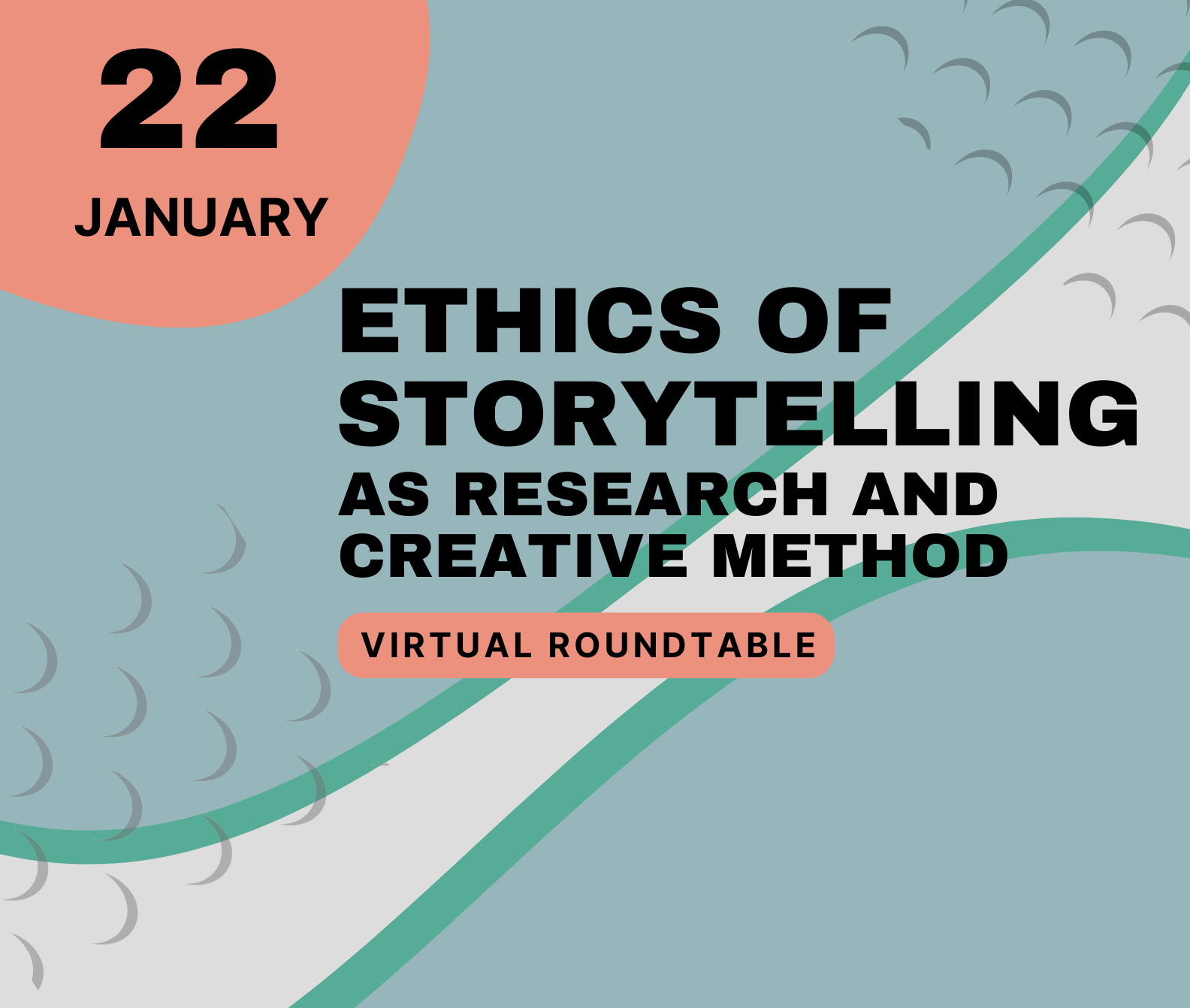Ethics of Storytelling as Research and Creative Method

How might researchers and artists develop more ethically grounded methods of soliciting, interpreting, and sharing participant stories? A virtual roundtable on the ethics of storytelling, presented by the ECU Research Ethics Board.
Storytelling is becoming an increasingly popular creative method across the arts, humanities, and social sciences. In design and arts-based research, storytelling is embraced as a collaborative approach that yields deeper and more personal insights into human experiences. In creative practice, gathering community stories is commonplace in public and socially engaged art. How can researchers and artists develop meaningful ethical practices around storytelling methods? What responsibilities do researchers and creative practitioners have to participant stories they gather, store, and share? This virtual roundtable, presented by ECU's Research Ethics Board, features speakers Aaron Nelson-Moody (Coast Salish art and design), Candace Brunette-Debassige (Indigenous education and academic policy), and Ranjan Datta (community-based disaster research).
Aaron Nelson-Moody / Tawx'sin Yexwulla is a Squamish First Nation educator who has worked to preserve Coast Salish art and culture. He works within his own community educational structure, and shares important traditions of intercultural connection in public schools, and through community engagement projects. His work on projects in various media include large scale wood carvings such as houseposts and canoes, down to smaller silver jewelry engraving and repousse pieces. He studied with and was lucky to work alongside the acclaimed Xwalacktun/Rick Harry, who is a wood and stone sculpture, jeweller, and teacher. Besides working on commission in woodcarving and precious metal jewelry, Aaron also teaches and runs workshops.
Dr. Candace Brunette-Debassige is a Mushkego Cree iskwew of Petabeck First Nation (Treaty 9) with Cree and French lineage. She is an Assistant Professor in the Faculty of Education and Teaching Fellow at Western University. Her research and teaching focus on Indigenous Peoples’ collective movements in Euro-Western colonial educational contexts. She is the author of Tricky Grounds, a book focusing on Indigenous women’s leadership experiences in advancing reconciliation and Indigenization movements in Canadian universities. Her doctoral dissertation was awarded the 2021 George L. Geis dissertation of the year award by the Canadian Society for Studies in Higher Education. She is also the proud recipient of a 2019 Peace Award for Truth and Reconciliation from Atlôhsa Family Services. Beyond her passion for research and teaching, Candace has extensive leadership experience driving institutional policy change at the K-12 and postsecondary levels. She has served as Acting Vice Provost /Associate Vice President (Indigenous Initiative), Special Advisor to the Provost (Indigenous), and Director of Indigenous Services at Western.
Dr. Ranjan Datta is the Canada Research Chair in Community Disaster Research at the Department of Humanities, Mount Royal University. Ranjan is a Senior Scientist for the International Science Council (ISC) and the United Nations Environment Programme (UNEP) and a Senior Research Fellow at the Earth System Governance Research Fellow Network, Utrecht University, Netherlands. Ranjan's research interests include community disaster research, assuming responsibilities for anti-racist and decolonial research, advancing critical anti-racist climate change resilience studies, and engaging in cross-cultural community research endeavours. His established research record includes pivotal roles as the primary applicant or co-applicant for over a dozen external research grants exceeding $10 million in funding. His significant contributions to academic discourse span 65 peer-reviewed journal articles and book chapters; four authored books; and five edited volumes. Furthermore, he has played a key role in shaping critical discussions in the field by developing a journal special issue dedicated to decolonial research, traditional story sharing, Indigenist community-based participatory action research, and the complex issues surrounding Indigenous land, water, and sustainability matters.
This roundtable is facilitated by Dr. Alla Gadassik, associate professor of Media History + Theory and Chair of the Research Ethics Board (2023-2024) at Emily Carr University.
This event is also supported by the ECU Decolonization + Indigenization fund and the NSERC-EDI grant.